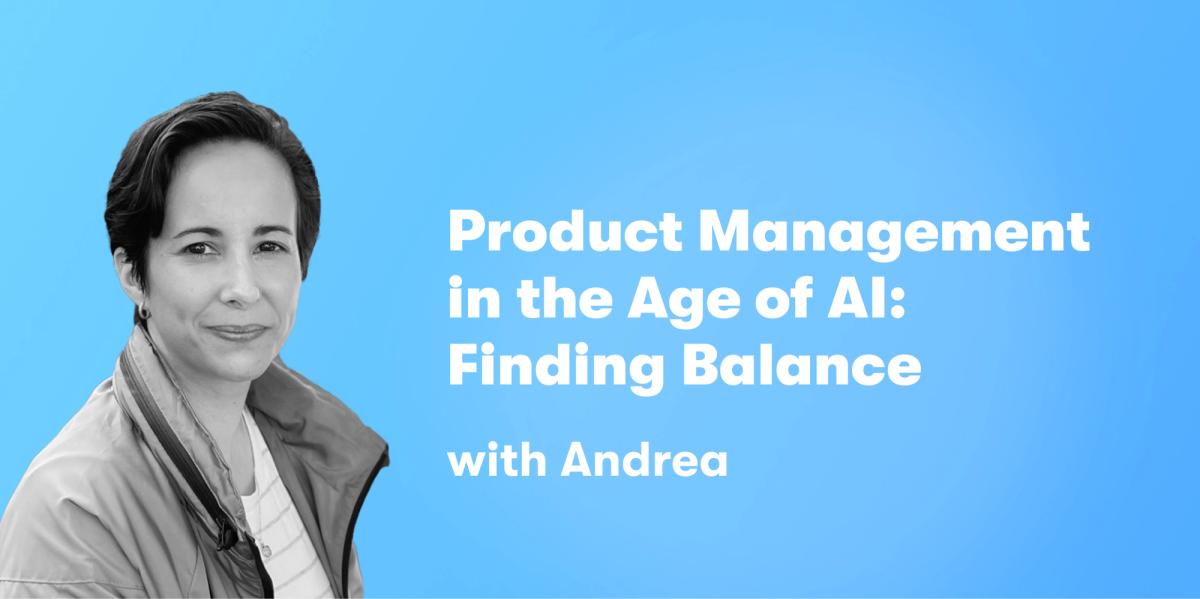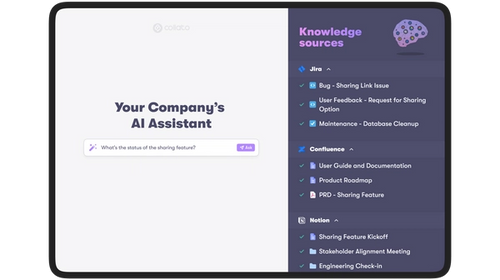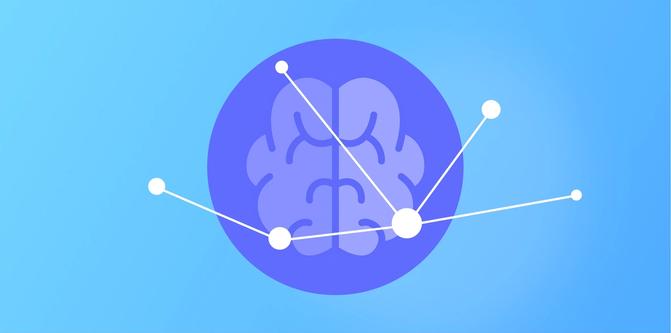Product Management in the Age of AI: Finding Balance with Andrea Saez

Andrea Saez, passionate about product, growth strategies and communication, shares her insights on the role of AI in decision-making, the importance of empathy in product management, and how product managers can effectively leverage AI as a complementary tool. Let's explore her perspective on these vital topics.
I do believe for the most part this has actually changed a tiny little bit. I think people are now more aware that tools that AI tools and writing tools are there as an assist but not a way for it to do the work for you. I do wish this was more prevalent across more roles and teams and industries because I do find it very easy to spot copy that was written by AI. Now of course my concern here is two-fold: the first is the lack of originality when it comes to how we're positioning products, how we're messaging products, etc. as that actually affects the human connection that we have with our audience.
When it comes to decision-making within product management, the danger is the over-reliance on AI to make those key decision for us because of decision paralysis. There is definitely a level of critical thinking involved in product management, as well as being able to take evidence from various sources and being able to understand why and how those decisions are being made. AI again is a fantastic tool for parsing and analyzing some of that evidence, but not making the final decision.
It's very important for everybody to understand that AI does not have empathy. It does not understand or comprehend what empathy looks like. It is a great tool, but for the most part, we are attributing what we think is empathy to it. A machine does not feel, and I think we're confusing sympathy with empathy a lot of the time. Even then a machine has no feelings so it can't really understand it. It might be able to describe it to you, but that's a different thing. When it comes to product management and empathy and the role of AI in helping us distill, analyze, and understand things like customer feedback or interviews - AI is going to be able to give us the tools that we need to get the job done faster, but where it is going to fall short is an understanding the human component behind the problems that are being described to us.
This is why it is so key for product managers and product marketers to constantly be talking to customers so that they can understand first-hand why issues are being raised and feedback is being given. There is a string of consciousness that can be tapped into when you are in a conversation with someone. AI is not capable of doing that.
As I said before, there is a string of consciousness that comes out of a conversation. Machine-generated insights are still going to give you a summary of a conversation but you're not going to be able to tap into why the conversation developed a certain way. I think we're looking at two different parts of the process with AI:
- First is the ability to hold the conversation and be able to ask questions to navigate and uncover new situations, feelings, behaviors, etc
- The second is the ability to distill that information and summarize it. This part is really great when having to present those insights to your team.
I really don't know that I have any other tips just remember that it's a tool. Use it as a way to elevate what you're trying to do, use it as a helpful way of summarizing, analyzing, and distilling information, or even providing you with a template so that you can do more work based on a baseline. But do not allow it to do the job for you.
For sure, I think that being able to ask the right questions is definitely the right path to empower product managers to use things like ChatGPT as a tool rather than a crutch. For example instead of asking chat GPT to rate something for you, ask it for a template to enable you to construct a blog post, a framework, or whatever else it is that you need. You can of course work with it to help you devise ways of expressing yourself better, but there still needs to be a level of human input involved in the process.
As I said earlier, it is very easy to spot things that are written with AI, because it tends to use the same sentence structure throughout. To me what that says is that the person that wrote the copy didn't actually take the time to do the job but instead relied on AI to do it for them. So if you are using AI to write things for you, make sure that you are going back and revising that copy, and to make sure that your own voice is actually coming through.
If you're going to use AI as a tool and trust me I do, so I'm not here to tell you not to do it, make sure that you are using the time that it's giving you to do the things that you wouldn't otherwise have time for. In particular, I am referring to speaking to customers and stakeholders. Product managers often get so busy with day-to-day stuff and putting out fires, that they often don't have the time to dedicate to conversations. There's a wealth of information that can be learned from your customer success team, your sales team, your marketing team, and of course your customers. It is by far a lot more valuable for you to sit down and have those conversations than to hear those things secondhand.
I am definitely worried about this outlook or thought process that somehow AI is going to be able to replace people like product managers, product marketers, designers, and even copywriters. It might certainly look beneficial from a cost-saving point of view for businesses, but it is a tragic turn to the experience that we're providing to customers. Just because AI is able to close tickets faster, for example, it does not mean that customers are satisfied or that their questions have been answered. We are sacrificing one thing for another and the cost does not add up. If anything, there is more danger of losing customers because of poor design, poor copy, or poor product management if we remove the human element involved in building unique experiences.
Andrea's insights shed light on the evolving landscape of Product Management in the era of AI. It is evident that while AI offers powerful tools and efficiencies, the human touch, creativity, and empathy remain irreplaceable in building exceptional products and maintaining strong customer relationships. Product managers should embrace AI as a valuable assistant but remember that their unique expertise and intuition are the driving forces behind successful product development.






